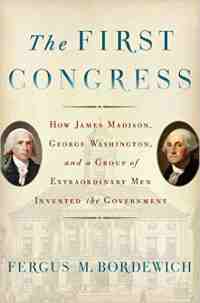
Published by Simon & Schuster on February 9, 2016
Before the first Congress convened, the nation was deeply in debt, providing that some things never change. Without a central currency, commerce was haphazard, and in the absence of a manufacturing base, there was little enough to buy. Even convening the House and Senate proved to be a challenge, given the distances that many members needed to travel.
Fergus Bordewich takes the reader through the work of the first Congress as it progressed from month to month. Bordewich offers insight into the political issues, the politicians, and the political realities of the time. It’s interesting to see how many precedents set by the first legislators remain unchanged. Of particular interest are Bordewich’s descriptions of John Adams’ botched attempt to turn the vice presidency into a meaningful office, culminating in “a lasting template for vice-presidential inconsequence.”
James Madison, a key figure in the drive to form the Constitution, was the driving force behind the accomplishments of the first Congress. He labored tirelessly to enact the Bill of Rights and to assure that the government would have revenues with which to operate (“money is power,” he wrote, a truth in every age). He even wrote Washington’s inaugural address. Then he wrote the House of Representatives’ letter thanking Washington for the address. Then he wrote Washington’s reply. Madison was also instrumental in beating back the anti-Federalists, who seemed incapable of accepting defeat (and still do) even though their crabbed notion of “state’s rights” would have undermined the future of the United States.
Other notable accomplishments of the first Congress included creation of the Treasury Department and the levying of tariffs and duties so that the government would be able to finance its ambitious projects. Those included the federal court system, a national bank, a census, protection of patents and copyrights, the Department of Foreign Affairs (now the State Department), the Department of War (now the Department of Defense), the negotiation of treaties with Indians that would permit the nation’s expansion, and a standing Army that would permit expansion notwithstanding the desires of Indians.
It’s interesting how many issues that vexed the first Congress continue to divide politicians. Is it better to allow free trade or should some imports be restricted or taxed? Should “friendly” nations receive favored trade status? What is the fairest way for government to raise revenues? To what degree should presidential power be subject to congressional oversight? Is it wise for the federal government to finance itself by incurring debt? Under what conditions should new immigrants become citizens?
It’s also interested to read about the colonial hatred of lawyers (something that hasn’t changed much in the intervening centuries). Yet lawyers did much of the nuts-and-bolts work of the first Congress, including the creation of the federal judiciary. Oliver Ellsworth, for example, proposed to give diversity jurisdiction to federal courts, allowing the citizen of one state to sue the citizen of another state in federal court, thus minimizing “home-field advantage” by taking cases away from state courts that were too often biased. Ellsworth also thought federal courts could manage the subtle distinction between privateering (which helped fund the government) and piracy, which was frowned upon.
Other important questions were debated and resolved by the First Congress, including the president’s right to fire his appointments to executive offices without congressional approval and the apportionment of congressional districts. Madison’s heroic effort to enact the Bill of Rights gets well-deserved attention, and includes some interesting tidbits that are not mentioned in a recently published book (The Bill of Rights) that covers the same ground.
In hindsight, the first Congress was not perfect. It condoned the massacre of Indians even as it entered into the first treaty with an Indian tribe. It did not abolish slavery. Bordewich devotes a couple of chapters to the shameful pro-slavery arguments that prevailed (which Ben Franklin satirically gutted just before his death). The debate about where to locate the capital was driven by real estate speculations, including George Washington and many congressmen. How to deal with governmental debt incurred prior to ratification of the Constitution was also marred by conflicts of interest. Still, Bordewich makes clear that the achievements of the first Congress were remarkable.
Bordewich writes in a clear voice that falls somewhere between the liveliness of popular history and the dullness of academia. Bordewich adds color to the narrative by describing what elected representatives did with their free time (pumpkin beer!) and by revealing their personalities (except for George Washington, who had none). The First Congress offers a revealing look at a tumultuous period in American history and the post-revolutionary politicians who helped the newborn nation live up to its democratic ideals.
RECOMMENDED